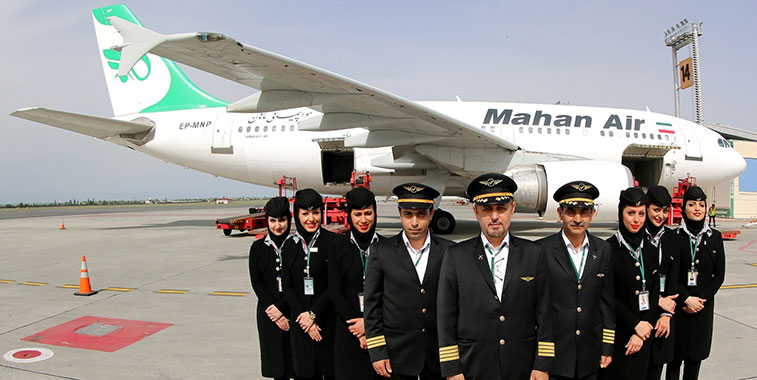PHOTO: Mahan Air is among eight Iranian entities sanctioned by US on Thursday
LATEST
- TV Producer Azizi’s Sentence Reduced to 2 Years
- Foreign Ministry Criticizes Extension of UN Human Rights Rapporteur
- Guardian Council Bans Reformist MP Elected in February
Iran’s Foreign Ministry has criticized new US sanctions on Iranian entities, more than two months after the implementation of a nuclear deal promising the lifting of American restrictions.
On Thursday, the US sanctioned eight entities, linked to the Revolutionary Guards, over Iran’s testing of ballistic missiles. The Department of Justice also indicted seven Iranians for a “coordinated cyber assault” on 46 banks and other American financial institutions from 2011 to 2013, and for an attempt to gain access to the control systems of a dam near New York City. A US district court charged Ahmad Sheikhzadeh, a consultant to Iran’s mission to the UN, for “conspiracy to evade U.S. sanctions against Iran, money laundering, and helping arrange false tax returns”.
Foreign Ministry spokesman Hossein Jabari Ansari said later on Thursday:
The Iranian missile program has not been connected with the JCPOA and does not violate [UN Security Council] Resolution 2231. The program is purely for defensive purposes; no action will be taken to deprive the Islamic Republic of its legitimate and legal rights to strengthen its defensive capability and national security.
The US says that the misisle testing, including launches two weeks ago, defy the UN resolution. Tehran says the measure only applies to ballistic missiles capable of carrying a nuclear warhead.
Two individuals and six firms were sanctioned. They include two Iran-based subordinates of Shahid Hemmat Industrial Group, “responsible for Iran’s liquid-fueled ballistic missile program”, and Mahan Air, accused of transporting funds and arms for the Revolutionary Guards.
Computer Attacks “On Behalf of Revolutionary Guards”
The US Department of Justice’s indictment of the seven Iranians did not claim direction by the Revolutionary Guards, but it said the “experienced computer hackers…performed work on behalf of the Iranian government, including the Islamic Revolutionary Guards Corps”.
Targets of the “distributed denial of service” attacks included JPMorgan Chase, Bank of America, Capital One, and PNC Bank. The indictment also claimed actions against the New York Stock Exchange and the telecommunications company AT&T.
The attempt to take control of the Bowman Dam in Rye, New York, reportedly failed because the dam was under repair and offline.
TV Producer Azizi’s Sentence Reduced to 2 Years
An Iranian appeals court has reduced the prison sentence of prominent television producer and writer Mostafa Azizi to two years.
Azizi, a Canadian resident, was initially given an eight-year term following his arrest in February 2015 while he was visiting family in Iran. He was sentenced by a Revolutionary Court on charges of “collusion against national security”, “insulting the Supreme Leader”, and “spreading propaganda against the system”.
Foreign Ministry Criticizes Extension of UN Human Rights Rapporteur
The Foreign Ministry has denounced the extension of the mission of Ahmed Shaheed, the UN Special Rapporteur on human rights in Iran, as “unnecessary and illegitimate”.
Spokesman Hossein Jaberi Ansari said the decision by the UN Human Rights Council is politically motivated and based on hostility towards Iran. He said Tehran does not feel duty-bound to accept and obey the resolution.
Since his appointment in June 2011, Shaheed has been barred by Iran from entering the country. Despite the restriction, he has compiled a series of reports documenting Tehran’s record on executions, political prisoners, and restrictions on freedom of speech and political activity.
In his latest report, presented two weeks ago, the Rapporteur cited a “number of positive measures in 2015″ to address concerns, but said other pressing issues…remain unaddressed, including the government’s use of capital punishment, which continues to surge at a staggering rate”. He also noted that discussion of amendments to repressive laws “do not always apply to individuals that are accused of national security crimes for the legitimate and peaceful exercise of fundamental rights, including the rights to freedom of expression, opinion, belief, assembly and association”.
On Wednesday, Human Rights Watch reported that Iran is continuing to restrict access to lawyers for detainees charged with national security offenses.
In June 2015, Iran expanded access during the investigative phase, implementing a June 2014 law.
However, based on interviews with lawyers, political prisoners, family members, and “sources familiar with cases of detainees”, HRW documented several cases where access has been denied or where detainees were forced to change their attorneys.
Guardian Council Bans Reformist MP Elected in February
The Guardian Council has retrospectively banned a reformist candidate who won a Parliamentary seat in February 26 elections.
Initial reports said the Council had dismissed the qualifications of Minoo Khaleqi, chosen for Isfahan Province.
However, after it was noted that the disqualification was weeks after the deadline for vetting candidates, a Council member said Khaleqi was not barred but “her votes have been annulled”.
The Reformist Coordination Council in Isfahan has written an open letter to President Rouhani protesting Khaleqi’s removal and calling for Rouhani to “issue the necessary order to avoid the violation of the people’s trust”.
Khalaqi said in a statement that she has had no contact with the Guardian Council about either her disqualification or the annulment of the votes.
A 30-year-old doctoral student in general law, she received the third-highest number of votes in Isfahan.

